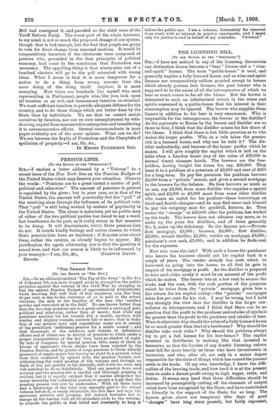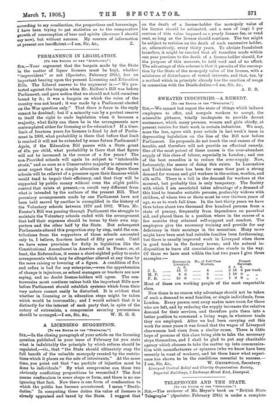THE LICENSING BILL.
[To SRI EDITOR or " SPECTATOR.'] have not noticed in any of the licensing discussions any distinction drawn between a "beer" license and a " wine- and-spirit " license. The term " public-house " is used, and generally implies a fully licensed house, and as wine-and-spirit licenses are comparatively seldom granted except to houses which already possess beer licenses, the poor brewer who is supposed to be the cause of all the intemperance of which we hear so much comes in for all the blame. But the brewer is interested to such an infinitesimal extent in the wines and spirits consumed in a public-house that his interest in their consumption may be ignored. The brewer who snpplies those liquors in addition to his beer is very uncommon. Who is responsible for the intemperance, the brewer or the distiller? As the payments to Excise by the brewer and distiller are as three to four, I think that the distiller misses his fair share of the blame. I think that there is but little question as to who makes the larger profits. Who as a rule takes the greater risk in a licensed house, and why can he take it ? The dis- tiller undoubtedly, and because of the larger profits which he makes. I will give roughly the capital which is laid on the table when a London house (say of the value of £20,000 in normal times) changes hands. The brewers are the free- holders, having bought the house for, say, £30,000. They lease it to a publican at a premium of £8,000 and rent of £600 for a long term. To pay the premium the publican borrows £4,000 from a " private " source, and gives a second mortgage to the brewers for the balance. He then borrows as much as he can, say £2,000, from some distiller who supplies a special spirit, and £2,000 or £3,000 more from some other distiller who wants an outlet for his product—these borrowings on third and fourth charges—and he may find some cash himself to pay the outgoing man for goodwill, fixtures, &c. Then comes the "change" at £20,000 after the publican has worked up the trade. The brewer does not advance any more, so to make up the price the distillers, and of them generally No. 2, make up the deficiency. So the figures are :—Private first mortgage, 24,000 ; brewers, 24,000 ; first distiller, £2,000; second distiller, £5,000; vendor on mortgage, £4,000; purchaser's own cash, £1,000; and in addition he finds cash for the expenses.
Now who runs the risk ? With such a house the purchaser who knows his business should get his capital back in a couple of years. The vendor already has cash which he borrowed ou going into the house, so all that he gets in respect of his mortgage is profit. As the distiller is prepared to take such risks, surely it must be on account of the profit which he makes. The brewer lets at a low rent to secure the trade, and the rent, with the cash portion of the premium which he takes from the "private" mortgage, gives him a fair return for his capital outlay,—the " private " mortgagee takes five per cent. for his risk. I may be wrong, but I hold very strongly the view that the distiller is the larger con- tributor to intemperance, and I think that there can be no question that the profit to the producer and retailer of spirits is far greater than the profit to the producer and retailer of beer. Were it otherwise, why should the value of a fully licensed house be so much greater than that of a beerhouse ? Why should the distiller take such risks ? Why should the publican always try to get a full license for his beer-house ? The capital invested in distilleries is nothing like that invested in breweries, so that the burden of any drastic licensing reform must fall far more heavily on those who have investments in breweries, and who, after all, are only in a minor degree responsible for the state of things which has caused the present crisis in the trade. Of my own knowledge, I know the diffi- culties of the brewing trade, and how hard it is at the present time to make a decent profit owing to high wages, rates, and duties. It seems very hard that these difficulties should be increased by peremptorily cutting off the channels of output which have been recognised by the State, and have contributed so liberally to the support of the State, for so long. The figures given ,above are imaginary (the days of good " changes" have long since passed), but fairly represent,
according to my recollection, the proportions and borrowings. I have been trying to get statistics as to the comparative growth of consumption of beer and spirits (decrease I should say now), but without success. My sources of information at present are insufficient.—I am, Sir, &c., Z.















































 Previous page
Previous page